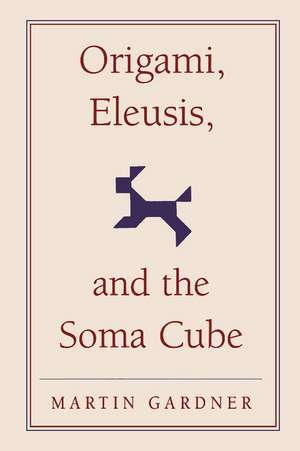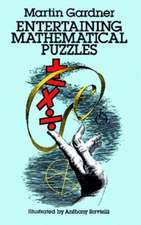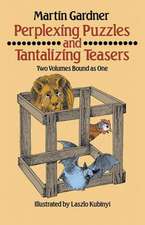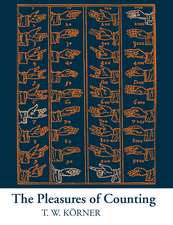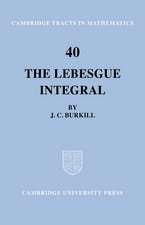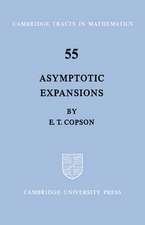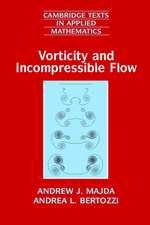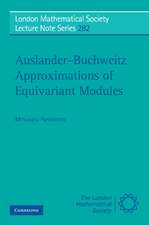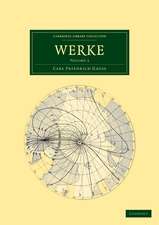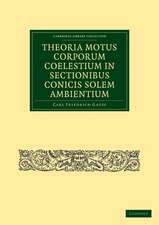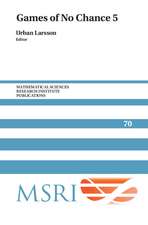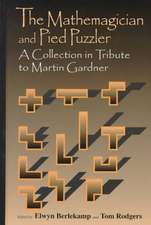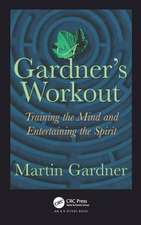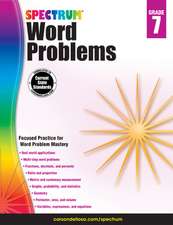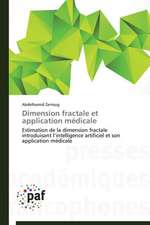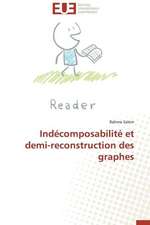Origami, Eleusis, and the Soma Cube: Martin Gardner's Mathematical Diversions: The New Martin Gardner Mathematical Library, cartea 2
Autor Martin Gardneren Limba Engleză Hardback – 31 aug 2008
| Toate formatele și edițiile | Preț | Express |
|---|---|---|
| Paperback (1) | 108.22 lei 3-5 săpt. | |
| Cambridge University Press – 31 aug 2008 | 108.22 lei 3-5 săpt. | |
| Hardback (1) | 768.35 lei 6-8 săpt. | |
| Cambridge University Press – 31 aug 2008 | 768.35 lei 6-8 săpt. |
Preț: 768.35 lei
Preț vechi: 893.42 lei
-14% Nou
Puncte Express: 1153
Preț estimativ în valută:
147.03€ • 157.22$ • 122.59£
147.03€ • 157.22$ • 122.59£
Carte tipărită la comandă
Livrare economică 18 aprilie-02 mai
Preluare comenzi: 021 569.72.76
Specificații
ISBN-13: 9780521756105
ISBN-10: 0521756103
Pagini: 248
Ilustrații: 7 b/w illus.
Dimensiuni: 140 x 216 x 18 mm
Greutate: 0.39 kg
Ediția:1
Editura: Cambridge University Press
Colecția Cambridge University Press
Seria The New Martin Gardner Mathematical Library
Locul publicării:New York, United States
ISBN-10: 0521756103
Pagini: 248
Ilustrații: 7 b/w illus.
Dimensiuni: 140 x 216 x 18 mm
Greutate: 0.39 kg
Ediția:1
Editura: Cambridge University Press
Colecția Cambridge University Press
Seria The New Martin Gardner Mathematical Library
Locul publicării:New York, United States
Cuprins
1. The five platonic solids; 2. Tetraflexagons; 3. Henry Dudeney: England's greatest puzzlist; 4. Digital roots; 5. Nine problems; 6. The soma cube; 7. Recreational topology; 8. Phi: the golden ratio; 9. The monkey and the coconuts; 10. Mazes; 11. Recreational logic; 12. Magic squares; 13. James Hugh Riley Shows, Inc.; 14. Nine more problems; 15. Eleusis: the induction game; 16. Origami; 17. Squaring the square; 18. Mechanical puzzles; 19. Probability and ambiguity; 20. The mysterious Dr Matrix.
Recenzii
'Martin Gardner's fifteen volumes about Mathematical Games are The Canon - timeless classics that are always worth reading and rereading.' Don Knuth
'Hexaflexagons, Probability Paradoxes, and the Tower of Hanoi and Origami, Eleusis, and the Soma Cube provide a taste of Gardner's prowess at devising quirky and fascinating mathematical conundrums. An excellent example is the 'generalised ham-sandwich theorem', which, among other things, explains how a doughnut can be sliced into 13 pieces by three simultaneous plane cuts.' Physics World
'I recommend you approach this book on a Sunday afternoon, with paper and pen, a few biscuits for brain-power and a good hour to spare for puzzling. It is worth it.' Charlotte Mulcare, Plus Magazine
'One of Gardner's real strengths as a writer of popular mathematics is his ability to choose topics that will appeal to the general public while also having some real mathematical content. … Like the first volume, this one is in the 'must have' category.' MAA Reviews
'… presents plenty of well-known and some less well-known mathematical problems. … The presentation of problems is completed with many illustrative pictures and photos in every chapter. It is possible to find traditional solutions of every problem and also some newer views, explanations and proofs of solved problems.' EMS Newsletter
'The ten chapters in this volume are a wonderful part of Martin Gardener's work, each updated with selections from the enormous correspondence he enjoyed with his readers. This collection of Gardener's writing should be a cornerstone of a personal library for mathematicians, teachers and students everywhere.' Mathematical Reviews
'Hexaflexagons, Probability Paradoxes, and the Tower of Hanoi and Origami, Eleusis, and the Soma Cube provide a taste of Gardner's prowess at devising quirky and fascinating mathematical conundrums. An excellent example is the 'generalised ham-sandwich theorem', which, among other things, explains how a doughnut can be sliced into 13 pieces by three simultaneous plane cuts.' Physics World
'I recommend you approach this book on a Sunday afternoon, with paper and pen, a few biscuits for brain-power and a good hour to spare for puzzling. It is worth it.' Charlotte Mulcare, Plus Magazine
'One of Gardner's real strengths as a writer of popular mathematics is his ability to choose topics that will appeal to the general public while also having some real mathematical content. … Like the first volume, this one is in the 'must have' category.' MAA Reviews
'… presents plenty of well-known and some less well-known mathematical problems. … The presentation of problems is completed with many illustrative pictures and photos in every chapter. It is possible to find traditional solutions of every problem and also some newer views, explanations and proofs of solved problems.' EMS Newsletter
'The ten chapters in this volume are a wonderful part of Martin Gardener's work, each updated with selections from the enormous correspondence he enjoyed with his readers. This collection of Gardener's writing should be a cornerstone of a personal library for mathematicians, teachers and students everywhere.' Mathematical Reviews
Notă biografică
Descriere
The second of fifteen updated editions of the collected Mathematical Games of Martin Gardner, king of recreational mathematics.
